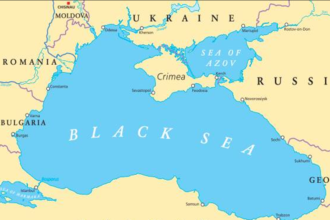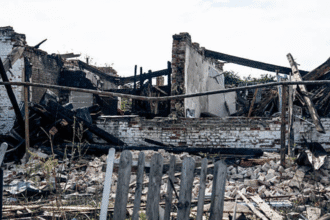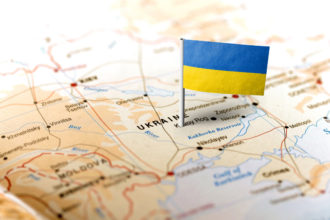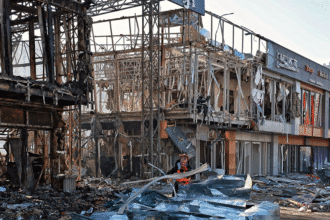Ukrainian President Volodymyr Zelensky has expressed hope that the United States will “stand strong” against Russian requests to waive sanctions as a condition for a Black Sea truce. On Tuesday, Moscow declared a maritime truce, allowing commercial vessels safe passage. The Kremlin said, meanwhile, that the ceasefire would only start after Western limitations on Russia’s food and fertilizer trade were removed. The continuous conflict in Ukraine has raised world tensions; hence, these conversations are critical.
During a panel interview with European reporters in Paris, Zelensky was asked whether the US would oppose Russian pressure. His reply was, “I hope so.” God bless you; they will. Still, we’ll see.
He underlined that any agreement should prioritize Ukraine’s sovereignty and security instead of caving into Russian restrictions. “We cannot let Russia prescribe peace on their terms,” he declared. We must stand together to safeguard the basic ideas of international law.”
What are Russia’s conditions for a ceasefire?
After three separate negotiations with American officials in Saudi Arabia, the White House verified that delegations from Russia and Ukraine had agreed to a Black Sea truce. Still, hours later, the Kremlin published a list of requirements.
Among Moscow’s requests are eliminating Western restrictions on financial institutions engaged in agricultural commerce and restoring access to the Swift international payment system, enabling safe financial messaging. Russia contends that these limitations impede its capacity to support world food security, especially grain exports.
Former US President Donald Trump said that the American government was “looking at” Moscow’s demand. Still, on Wednesday, the European Union repeated that it would not contemplate easing sanctions unless Russia unconditionally withdrew from the internationally recognized territory. Due to the Ukraine War, these sanctions have been a significant contention in diplomatic talks.
Zelensky said Russia was using food security to control the West, negating Russia’s allegation that sanctions were damaging global food supply systems. He remarked, “They are interested in control; they are not interested in food security.”
Zelensky’s opinion of US support?
Zelensky thanked the Paris group for their bipartisan support of Ukraine from the US. He also worries that confident lawmakers seemed “under the influence of Russian narratives.”
“We cannot agree to those narratives,” he insisted firmly.
He underlined that Ukraine’s defence initiatives could not last without continuous US military and financial help. “We are fighting for democracy itself as much as for our land,” Zelensky said.
When asked whether Trump paid closer attention to Russian President Vladimir Putin or him, Zelensky retorted, “I’m not sure – it’s tough for me to say. I don’t know his relationships or the quantity of his chats.”
Is Europe Rising to Help Ukraine?
Zelensky was also asked about remarks made by Trump ambassador Steve Witkoff, who lately criticized Europe’s attempts to form a “coalition of the willing” to back Ukraine. Zelensky responded, saying he would not “hastily drive to conclusions.”
He pointed out that Witkoff, having a background in property development, might not have the required experience. “As far as I know, he know very well how buy and sell real estate, but that’s somewhat different,” he said.
Though some were sceptical, Zelensky admitted that Europe had “strengthened itself significantly” during the Ukraine War.
How will Zelensky be remembered?
When asked how he felt history would view him, Zelensky claimed it was not his aim to shape his legacy. “I’m not sure what historical accounts will feature about me,” he remarked. It’s not my aim or goal.”
Instead, he underlined that his goal was to preserve Ukraine and ensure his children would “walk along their streets without hiding.” Declaring, “I will do everything I can until the end of my days to defend Ukraine as much as I can,” he said.
Should Ukraine ally itself with NATO?
Zelensky underlined his conviction that if Ukraine is admitted to NATO, it will become a “battle-hardened” country, strengthening NATO. He did admit, though, that the Trump administration had earlier decided against Ukraine’s joining the alliance.
He also said that Ukraine’s military experience in the current war had given it a unique capacity to support NATO’s collective security. “We are offering strength; we are not seeking for charity,” he said.
Europe’s current role is what?
After seeing French President Emmanuel Macron, Zelensky travelled to Paris. The Eiffel Tower was lit in Ukrainian flag colours in remembrance of him. His trip back to Europe is meant to inspire supporters to pay Putin’s threat top importance.
European countries had formerly mainly depended on American military help. However, given Trump’s recent remarks, European leaders clearly understand that US support cannot always be assured. This insight has driven them to assume more responsibility for Ukraine’s defence.
Zelensky’s main struggle is getting specific money pledges instead of merely words of encouragement. Positive outcomes from his meeting with Macron already have come from France proposing a new €2 billion ($2.2 billion; £1.6 billion) military aid package for Ukraine.
Macron clearly stated Russia’s demand for lifting sanctions: “Moscow cannot dictate the conditions for peace.” He underlined that it was early to discuss removing European sanctions on Russia.
Topics of the forthcoming European Summit?
European officials will assemble in Paris on Thursday for a summit co-hosted by Macron and British Prime Minister Sir Keir Starmer. The conference will centre on the crisis in Ukraine and look at how European countries may help to preserve a future ceasefire should one be decided upon.
Excluding the US, the “coalition of the willing” seeks to create a framework for European and other foreign support. Sir Keir said, “Stressing Europe’s dedication to Ukraine’s future, Sir Kpe is stepping up to play its part to defend Ukraine’s future.”
“Now Putin needs to show he’s willing to play ball,” he would say. For world diplomacy, the Ukraine War still defines a turning point.
Will this affect global stability?
As debates on the Ukraine War develop, more general consequences for world peace remain a key worry. Critics contend that compromises with Russia might create a risky model for future autocratic governments. “If we let aggressiveness flourish here, it will inspire like behavior elsewhere,” Zelensky cautioned.
In the meantime, global markets are still responding to the continuous conflict as changes in food supplies and energy prices generate financial instability. Experts feel that ongoing Western solidarity in favour of Ukraine will significantly shape the fate of the battle.
Zelensky’s message is ultimately still unambiguous: Ukraine is fighting for the values of sovereignty and democracy globally, not only for its survival.








